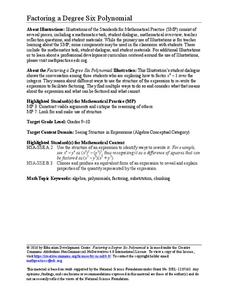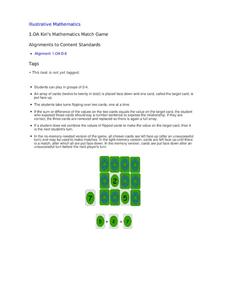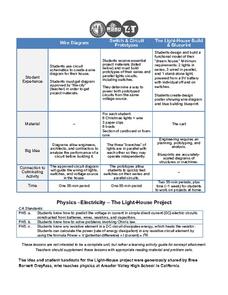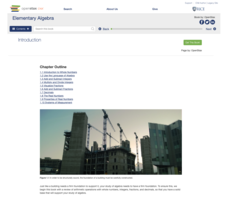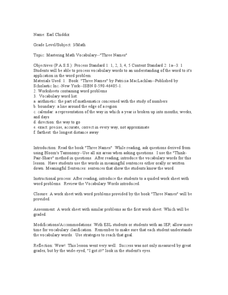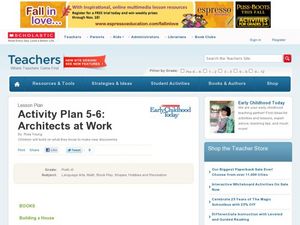Education Development Center
Factoring a Degree Six Polynomial
Within collaborative groups, scholars factor a degree six polynomial. They can factor the polynomial using many different strategies — a great way to prompt mathematical discussion.
Illustrative Mathematics
Kiri's Mathematics Match Game
Learning math is so much more fun when it involves playing games. Following the rules of the classic game Memory, young mathematicians flip over two cards at a time as they look for numbers whose sum or difference is equal to the value...
Rational Number Project
Initial Fraction Ideas: Lesson 3
Visual models support young mathematicians as they deepen their fractional number sense in this elementary math lesson. Using fraction circle manipulatives, children explore basic unit fractions as they develop the fundamental...
West Contra Costa Unified School District
Quadratic Equations — What We Know
Everything you could possibly want to know about quadratic equations, all in one resource. Instructors demonstrate how to translate between different forms of quadratics (equation, table of values, graph, verbal description) and finding...
West Contra Costa Unified School District
Polynomial Division
Multiply the ways your scholars can find the quotient with polynomial division. A lesson introduces polynomial division via long division, synthetic division, generic area model, and using the definition of division. Learners then...
Curriculum Corner
Measures of Central Tendency
Reinforce the concept of central tendency—mean, median, mode, and range—with a practice packet that comprises of eight problems and a structured answer sheet with plenty of room to show work.
Rational Number Project
Rational Number Project: Initial Fraction Ideas
Deepen the fractional number sense of young learners with this introductory lesson on equivalent fractions. After completing a short warm-up activity, children go on to work in pairs using fraction circles to complete a table of...
K-5 Math Teaching Resources
Base Ten Mat (Tens and Ones with Tens Frame)
Working with base 10 blocks? Use this base 10 mat to organize blocks, tens and ones with one ten frame, and determine how many groups of blocks can be used to represent numbers.
Education Development Center
Making Sense of Unusual Results
Collaboration is the key for this equation-solving lesson. Learners solve a multi-step linear equation that requires using the distributive property. Within collaborative groups, scholars discuss multiple methods and troubleshoot mistakes.
Education Development Center
Integer Combinations—Postage Stamps Problem (MS Version)
Number patterns can seem mysterious. Help your learners unravel these mysteries as they complete an intriguing task. Through examination, collaborative groups determine that they are able to produce all integers above a certain...
Trash For Teaching
The Light-House Project
Groups work together to design a lighthouse, from designing and drawing the wiring diagram, to creating prototypes of the switch and circuit, to envisioning and building a scale model along with a blueprint. By including different...
Mathematics Vision Project
Circles and Other Conics
Through a variety of hands-on activities and physical scenarios, this far-reaching unit leads learners through an exceptionally thorough exploration of circles and parabolas as conic sections. Geometric construction techniques are used...
American Statistical Association
A Sweet Task
Candy is always an effective motivator! A fun math activity uses M&M's and Skittles to explore two-way frequency tables and conditional probability. The candy can serve a dual purpose as manipulatives and experimental data.
Mathematics Assessment Project
Middle School Mathematics Test 3
Real-life mathematics is not as simple as repeating a set of steps; pupils must mentally go through a process to come to their conclusions. Teach learners to read, analyze, and create a plan for solving a problem situation. The...
Mathed Up!
Scatter Graphs
Make an estimate by getting in line. The class works with scatter plots and lines of best fit to make an estimate for given values. Pupils determine whether there is a positive or negative correlation and draw a best-fit line. Using the...
Illustrative Mathematics
What's the Point?
Given a certain amount of points, how many line segments can you connect between them? How many close geometric figures can you create? These are the types of questions learners are asked to solve in a assessment-based worksheet.
Concord Consortium
Crossing the Axis
Mathematicians typically reference eight different types of functions. Scholars learn about the requirements for graphing a function and must decide how many different functions fit. To finish, they define each specific function meeting...
Rice University
Elementary Algebra
Find all the Algebra 1 content in one location. A helpful eBook contains the content typically found in an Algebra 1 course. Concepts range from solving and graphing linear equations to solving and graphing quadratic equations....
BioEd Online
Bone Structure: Hollow vs. Solid
What is meant by the phrase "form follows function?" Allow your budding biologists to discover first-hand through two activities. In the first, groups work together to discover whether a solid cylinder or an empty cylinder can support...
Curated OER
three Names Lesson
After the book Three Names is read aloud, math vocabulary is introduced . Either alone or in groups, learners use the vocabulary words in a meaningful sentence. Then they complete the provided worksheet.
Curated OER
Linear Equations
This is a great lesson plan from start to finish. With partners and on their own, learners write and solve linear equations and inequalities. They use manipulatives, group work, and an included worksheet to make magic with their problem...
Curated OER
Prime Time Math: Emergency
Eighth graders, while using Prime Time Math: Emergency software, use math and medical data to participate in the diagnosis of a girl. Just like the medical team in the story, they will be using math to respond to a medical emergency- a...
Curated OER
Activity Plan 5-6: Architects at Work
Students build on what they know to make new discoveries. In this early childhood lesson plan, students engage in a block-building activity to develop language, math, and fine-motor skills.
Curated OER
Working Backwards
Sixth graders make up their own math problems. There is only one restriction. That is, the answer has to be the one you are going to give them in a sealed envelope. The problems that they make up can be anything they like. Let Students...


